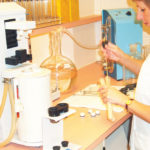Global trading house Cargill said on Tuesday it plans to cut around five per cent of its staff, or about 8,000 jobs after revenue slumped in its most recent fiscal year as crop prices hit multi-year lows.



The time might be ripe for a revival of Prairie co-ops

Farmers and the grain trade may have many common interests, but they are not perfectly aligned

Increased grain production means new records are needed to move the crop, shippers say

Grain companies, Canadian Grain Commission working but unsure of future

AAFC's review of Grain Act, and of CGC's future, continues



